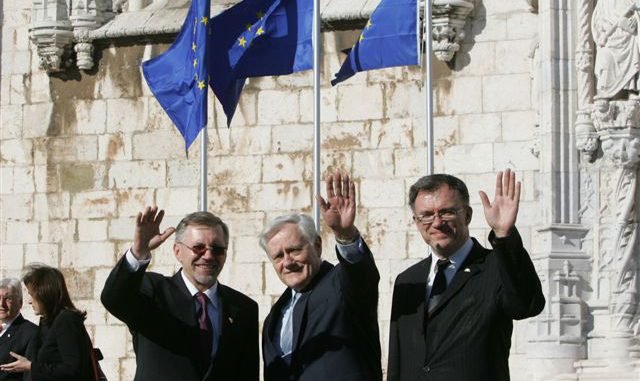
The European Union‘s foundation agreement marks its 60th anniversary on March 25. It was signed by just six states then. Today the Union is comprised of 27 states and around 500 million citizens. The 60th anniversary is not only a happy one, however. United Europe is plagued by a number of problems – increasing Eurosceptic opinions and political powers, uncontrolled migration crisis, economic problems, rising terrorist threats and, of course, the withdrawal of the United Kingdom. The future of the European Union was discussed in the talk show Dėmesio Centre with Lithuanian ambassador to the UK Lina Skaisgirytė, Eastern European Studies Centre Director Linas Kojala, Seimas Committee of European Affairs Chairman Gediminas Kirkilas and the head of the European Commission mission in Lithuania Arnoldas Pranckevičius, LRT.lt reported.
Gediminas Kirkilas points out that in a certain regard the EU has become more vulnerable over the past ten years. This is due to issues ranging from the economic crisis and the struggle to escape such economic downturn to the rise of populists preying on the optimism lost due to such economic troubles. He does point out that he does not believe that Germany will succumb to populism even if Angela Merkel is not re-elected, furthermore adding that he is certain that Marine Le Pen will not win the French elections and that the Dutch elections ended successfully; only the fact of Brexit remains a significant headache. He stresses that much more can be achieved if the member states work together in combating terrorism, even with the withdrawal of the UK.
Regarding the five future scenarios the European Commission has proposed, A. Pranckevičius explains that discussions on what path the EU will take are being held actively at various levels in all 27 member states, seeking alternate views. The politician outlines that the discussions should likely last up to December, by which point the German and French elections will be over, which should bring further clarity. Pranckevičius points out that the Dutch elections breathed new life into faith in the future of Europe, but this should not be any reason to halt discussions on the future or discussions on problems ranging from migration crisis to Brexit negotiations, to Russian aggression in Ukraine, to the Syrian conflict and terror. He stresses that given the rising external threats the EU must reform, change and renew itself.
L. Kojala explains that a multi-speed Europe has de facto existed for some time now and the concept appears to be supported by the major EU states. The best illustration of the multi-speed concept is how there currently are 28 member states, but only 19 have adopted the euro. Kojala outlines that some states may choose further integration if their publics support it and if sufficient political will is found, while others may choose to be less involved and this appears to be a likely way forward. The Visegrad states have been opposed to such an approach, however, but Kojala stresses that in this regard it is better to propose adequate reform, rather than strictly oppose because in the end the member states cannot be perfectly equal.
A. Pranckevičius points out that Lithuania is greatly involved in the European Union, being both a member of the Eurozone and Schengen. The country is intent on remaining highly involved in EU policy making because this can best protect Lithuania’s vital interests and to do this, in terms of politics, it is best to remain within, rather than in the periphery. Both G. Kirkilas and A. Pranckevičius point out that no significant changes in core EU agreements can really be expected, with G. Kirkilas pointing out that overall a multi-speed Europe is no bogeyman for Lithuania.
Regarding the future of the EU and the potential for it to be only based on the common market, L. Kojala points out that there is little likelihood that a stable EU mechanism based on just the common market could be agreed on. He explains that if the EU survives for another decade, it will be good reason for enthusiasm. While the current crises force us to accent the various issues the EU faces, it is notable that in the end the EU is still gradually moving forward – even if it is gradual and after much bickering, migrant flows to the EU are diminishing, the EU may have done too little to halt Russian aggression in Ukraine, but sanctions were put in place with the agreement of the 28 member states. The political scientist stresses that the EU is not just in crisis, but can also still make good decisions.
G. Kirkilas adds that the EU budget is too small and if it was raised from 1% of GDP contributions to 2%, there would arise far greater opportunities and the small budget already goes a long way.

Be the first to comment